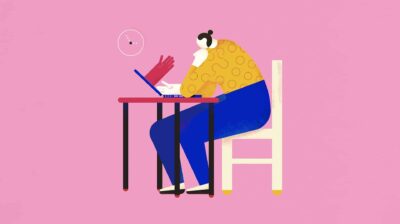What is anxiety?
Symptoms, causes, and the difference between anxiety and an anxiety disorder.

Experiencing anxiety or becoming stressed from time to time is a normal response to the demands of everyday living. You might become stressed by a job interview, an upcoming exam, or household chores.
Experiencing mild-to-moderate levels of stress occasionally can be helpful when it allows us to:
- Avoid potential danger in our environment, such as a busy street with fast-moving traffic
- Meet basic physical, emotional, and social needs, such as going grocery shopping or going out to meet friends
- Make positive changes to our lifestyle or behaviours
However, if chronic stress or anxiety starts affecting your ability to perform your daily tasks, it might be a sign that you could benefit from seeking support or learning some new coping techniques. This might be the case if you find yourself constantly overwhelmed by your workload, missing deadlines, or struggling to keep up with your studies because anxiety is making it hard to concentrate.
You don’t have to wait until stressors, big or small, become too much to handle before reaching out for help. Getting help before reaching a crisis can often lead to a quicker path to feeling calmer. Read our factsheet on how to deal with anxiety.
What are the differences between anxiety, stress, and worry?
Stress, worry, and anxiety are all terms that are used often and as if they all share the same meaning. However, they are different concepts. The differences between stress, worry, and anxiety are explained below.
What is worry?
Worrying typically involves thinking about future events with uncertain outcomes. While worry can become problematic when it becomes excessive or uncontrollable, worrying can also have positive effects in some cases. For example, research suggests that worrying can help us to get to the root of a real or imagined problem, seek more information about the problem, or think about different ways of responding to the problem.
Although worrying can be tied to stress and anxiety for some people, worry is not the same as stress or anxiety.
What is anxiety?
Worry is usually focused on a specific issue but anxiety often feels more general, like a constant sense of unease. Anxiety tends to be a more persistent feeling that something might go wrong, even if you can’t always identify why. While worrying is linked to problem-solving coping strategies in some people, the effects of anxiety on how we think and view ourselves tend to be more negative. Some of these effects might include:
- Lower belief in your problem solving abilities
- Tendency to take responsibility for things going wrong instead of things going well
- Tendency to avoid problems or use emotion-focused coping strategies more often than problem-focused strategies. Emotion-focused coping strategies involve dealing with the emotional impact of a problem, whereas problem-focused strategies aim to resolve the problem by addressing the underlying cause
What is stress?
Stress describes our response to a short-term, recognisable threat. Medical professionals use the term “stress” to describe any physical, mental, or emotional demand that places pressure on the body.
Stress isn’t always bad, especially when it’s short-lived—it can actually help motivate you to get things done. For example, you might feel stressed when a situation requires your immediate attention, like a big project or balancing multiple responsibilities. This type of stress can serve as a signal, pushing you to take action, work on the project, or prioritise tasks that are most important.
However, stress can become problematic when it lasts for a long time and overwhelms your ability to cope. Continuous stress can be caused by things such as a demanding job that consistently exceeds your energy limits, long-term mental health challenges, or living with a chronic illness. Social factors, like experiencing regular discrimination, can also contribute to stress. The causes of stress are often complex and can overlap, involving biological factors (what happens in your body), psychological factors (how you think and process information), and social factors (how relationships and interactions impact you).
If stress persists for too long, it can make you feel overwhelmed and contribute to feelings of worry or anxiety. However, stress, especially short-term stress, like stress you might feel in the lead up to an exam, does not always lead to worry or anxiety, and worry and anxiety do not always lead to stress.
What are the symptoms of anxiety?
Each of us tends to have a different idea of what counts as stressful, whether that’s sitting exams or public speaking. Although we each have unique triggers, our reactions to stress and anxiety can often look and feel very similar.
This similarity is due to the fact that our bodies share the ‘’fight or flight’ response, which releases hormones like adrenaline, in response to threat. This causes common physical symptoms, such as sweaty palms, dry mouth, and a rapid heart rate. However, anxiety symptoms aren’t just what happens to our bodies, they also affect how we think, how we relate to other people and how they relate to us.
If you are feeling anxious, you may experience any combination of the following symptoms:
- Difficulty concentrating
- A sense of feeling constantly on edge
- Headaches
- An increase in blood pressure, breathing and/or heart rate
- Feeling faint, dizzy, or sweatier than usual
- Feeling fidgety, nervous, or restless a lot
- Irritability and anger
- Increase in drug use
- Changes in your eating habits (e.g., eating too much or not enough)
- Insomnia or difficulties sleeping
- Feeling run down or tired
- Feeling overwhelmed or panicked, even about small things
What are panic attacks?
You might sometimes have sudden and intense anxiety episodes, during which you may notice symptoms like nausea, shortness of breath, and a rapid heartbeat. While you have likely used the term “anxiety attack” at least once in describing these episodes, this is not an official medical term. These intense anxiety episodes are more accurately referred to as “panic attacks.” You can find out more about panic attack symptoms and how to cope with them by reading our factsheet on panic attacks.
What is causing my anxiety?
There are many different causes of anxiety, ranging from worries about trouble in a close relationship to the fear and stress of having poor access to essential services like medical care or housing. Even “happy changes” or transitions, such as moving to a nicer home or the arrival of a new sibling, can cause stress because they require adapting to a new norm. Just like the symptoms of anxiety, the causes of anxiety can have biological, psychological, and social origins.
Anxiety can generally be divided into two types: primary and secondary. Primary anxiety is not caused by another health condition but comes from factors like life stress, genetics, or a mix of both. Secondary anxiety is a symptom of other pre-existing health challenges, such as:
- A mental health condition other than an anxiety disorder, such as depression or bipolar disorder
- A physical illness, like endometriosis or diabetes
- A neurodevelopmental condition, such as Autism or attention deficit hyperactivity disorder (ADHD)
Below are some of the more common sources of anxiety:
- Falling ill or developing an injury
- Experiencing chronic mental or physical illness(es)
- Caring for a person who is experiencing chronic mental or physical illness(es)
- Experiencing abuse or trauma
- Trying to keep up with everyday tasks, including household chores, travelling to and from work, and minding children
- Going through a breakup, separation, or divorce
- Experiencing difficult relationships with parents, siblings, friends, children, or a partner
- Losing a close friend, partner, or family member
- Losing your job or experiencing long-term unemployment
- Starting a new job
- Sitting exams or trying to meet other deadlines
- Living in poverty or trying to manage debt
- Experiencing housing insecurity or homelessness
- Experiencing stigma or discrimination, e.g., racism, xenophobia, homophobia, ableism, etc.
Do I have an anxiety disorder?
If you have been experiencing intense anxiety that interferes with your ability to perform daily activities, such as socialising or attending school or work, for more than six months, you may be living with this disorder. People with anxiety disorders don’t just feel anxious occasionally. Instead, they experience persistent anxiety that doesn’t go away on its own and may even worsen over time.
There are many different types of anxiety disorder, some of which include:
- Social Anxiety Disorder (social phobia)
- Generalised Anxiety Disorder
- Separation Anxiety Disorder
- Selective Mutism (i.e., a person finds themselves unable to speak in certain social situations)
- Panic Disorder
- Agoraphobia (i.e., fear of going to places outside the home)
- Specific phobias, such as a fear of spiders
If you are experiencing anxiety and would like more information on how to manage it, read our factsheet on dealing with anxiety.
Feeling overwhelmed and want to talk to someone?
- Get anonymous support 24/7 with our text message support service
- Connect with a trained volunteer who will listen to you, and help you to move forward feeling better
- Whatsapp us now or free-text SPUNOUT to 50808 to begin.
- Find out more about our text message support service
If you are a customer of the 48 or An Post network or cannot get through using the ‘50808’ short code please text HELLO to 086 1800 280 (standard message rates may apply). Some smaller networks do not support short codes like ‘50808’.






